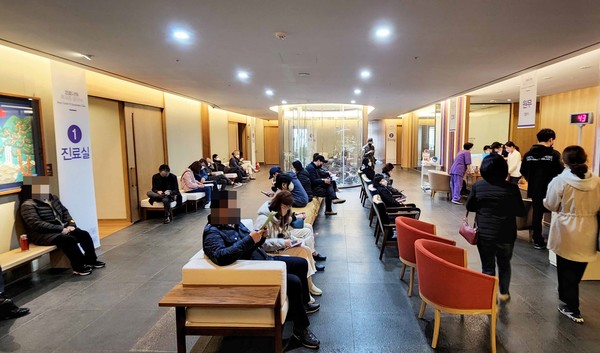Many people recovering from Covid-19 complain about aftereffects, but there are no standardized diagnostic criteria or treatment guidelines, confusing clinical fields, according to medical workers.
The larger the number of Covid-19 patients, the more the people suffering from long Covid, with some experiencing its aftermath for more than two years.

(Credit: Myongji Hospital)
Against this backdrop, researchers at China’s National Clinical Research Center for Respiratory Diseases released the study results of their two-year follow-up observations of 1,119 recovered patients on Lancett Wednesday. It is the longest research into long Covid.
The subjects were individuals who survived hospitalization with Covid-19 and were discharged from Jin Yin-Tan Hospital in Wuhan, China, from Jan. 7 to May 29, 2020. After two years, the researchers had a face-to-face interview with them and found 650, or 55 percent, had one or more symptoms. The corresponding share rose to 66 percent when checked six months after discharges.
About 31 percent of the total subjects experienced fatigue and muscle weakening, higher than the control group not infected by Covid-19.
In Korea, too, an increasing number of people suffer from “long” long Covid, forcing hospitals to run separate clinics for them. Again, however, medical professionals point out that they need standardized guidelines for correct diagnosis and proper treatment of these symptoms.
A local expert agreed.
Hah Eun-hye, head of the Long Covid Clinic at Myongji Hospital in Goyang, north of Seoul, said the clinic treats long Covid patients based on its protocol but ran into limitations in a recent paper contributed to the E-Newsletter of the Korean Academy of Medical Sciences.
“We have made a protocol after discussing tests and treatments concerning post-Covid-19 conditions,” Hah said. “We asked recovered patients to answer questionnaires on symptoms, including anxiety, depression, and fatigue, before meeting doctors. Physicians at respiratory, home medicine, and neurological departments took part in the clinic.”
According to Hah, when visitors need special tests or treatment, the hospital asks related departments for interdisciplinary cooperation, enabling them to be treated daily.
The physician also recalled that upon opening the Long Covid Clinic, they found most of the visitors were acute patients just released from quarantine, rather than those suffering from long Covid.
“Although respiratory syndromes got better as time went by, fatigue continued far longer and even aggravated over time,” she said. “Long Covid undoubtedly exists, and we felt the need for appropriate diagnosis and treatment at the right time through ongoing studies. However, in the case of fatigue, there were not many causes triggering exhaustion, requiring further studies on its mechanism and treatment.”
Noting that the Covid-19 virus is the first case since HIV that one virus could exert influence on so many diseases, Hah said it is regrettable that there are no unified treatment standards or clinical guidelines on its aftermath.
“One thing is certain – it ain’t over till it’s over (when all diseases and symptoms of patients are gone),” she said.

